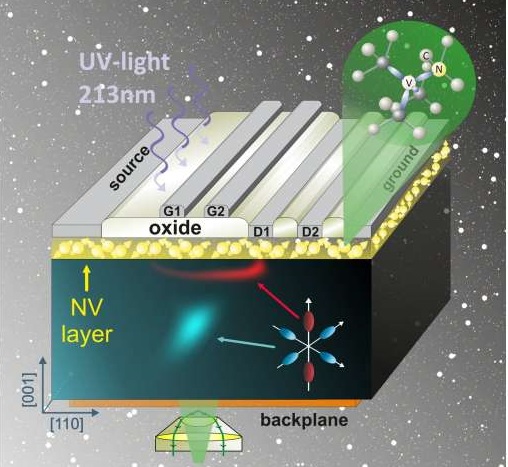Researchers have, for the first time ever, demonstrated electrical control of valley transport in 3-D dual-gate diamond field-effect transistors.
Not many people are aware of it, but the diamond is actually a wide-bandgap semiconductor with many extremely good properties, such as high thermal conductivity, high breakdown field, high carrier mobilities, and chemical inertness. These properties, together with the possibility to synthesize high-purity, single-crystalline diamond make it a very interesting material and a candidate for use in power electronics. The low impurity concentration achieved when fabricating diamond, together with its rigid lattice, causes it to exhibit a uniquely low scattering rate, especially at low temperatures. For this reason, electrons tend to remain in a defined valley and it is then possible to observe valley-polarized electron ensembles, which we have previously proven to exist.
What is valleytronics?
Valleytronics is a concept for transporting information using the electron’s polarization state instead of its charge, as used in modern electronics. It has lately attracted considerable attention from the physics community and provides a new paradigm for storing and processing information in quantum-computing applications. Fast, scalable, and direct electrical control of valley states without the use of strong external magnetic fields is crucial for achieving practical devices.
Researchers are successful in fabricating valley transistors on single-crystalline diamond plates with ultra-low nitrogen impurity concentrations. In order to gain a high degree of freedom of the control of the valley currents, they use a dual-gate configuration. The control of the location and time of the valley-polarized currents was achieved by adding multiple drain electrodes. By changing a gate bias voltage, it was possible to locally manipulate the charge states of nitrogen-vacancy centers and allowed guiding valley-polarized currents. This means that at a precise time, which gives control over which type of electron goes to each contact. Outside the field of topological transport in low-dimensional materials, electrical control of valley transport has previously never been accomplished experimentally.
These valleytronic devices enable electrostatic manipulation of valley currents and can be used to deliver electrons with a high degree of valley polarization for, e.g., electrical pumping of color centers in diamond for single-photon sources.









